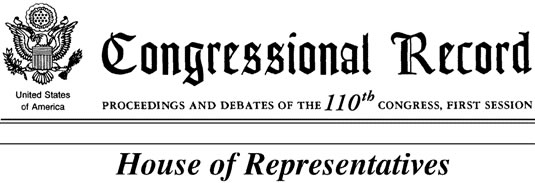
May 1, 2007 Mr. SMITH of New Jersey. Madam Speaker, I thank my colleague, Mr. Pitts of Pennsylvania, for authoring this important resolution recognizing the abolishment of the inhumane, grossly immoral and ubiquitous British slave trade 200 years ago, and the highly principled member of the House of Commons, William Wilberforce, who poured his life into that noble cause. One man can--and did--make a difference.
H. Res. 158 also links the abolition issue to today's modern-day slave trade, human trafficking, and I appreciate that the gentleman from Pennsylvania recognized that there are lessons learned that need to be applied to our current battle against modern-day slavery.
Madam Speaker, William Wilberforce was 21 years old when he was elected to the House of Commons in 1780. And perhaps like some of us, later said, ``The first years in Parliament I did nothing, nothing to any purpose. My own distinction was my darling object.''
But that all changed, Madam Speaker, after a profound conversion to Christianity and a serious rethinking as to whether politics, with all of its diversions, distractions, vanity, lies, and deception, was compatible with his ever-deepening religious faith. He even thought of quitting politics and entering into a ministry.
John Newton, the former slave captain turned convert to Christ, among others, encouraged him to fight the battle against slavery where it could be won, in Parliament. The Commons is the place where you can stop slavery. Wilberforce agreed, and then poured his life into that battle.
William Wilberforce once said: ``Never, never will we desist until we extinguish every trace of this bloody traffic to which our posterity, looking back to the history of these enlightened times, will scarce believe that it has been suffered to exist so long to disgrace and dishonor this country.''
He also said: ``So enormous, so dreadful, so remediable did the trade's wickedness quickly appear that my own mind was completely made up for its abolition.''
Madam Speaker, 200 years ago the slave trade was abolished, and he went on for the rest of his life with a group of prayer warriors, men and women who prayed every day for the abolishment of the slave trade, who believed it was a blight not just against man and woman, but against God himself. And it was through prayer and action that they came up with a number of very interesting and creative legislative ways of trying to stop it.
Wilberforce was also tenacious. Time and time again, he would offer his bill to abolish the slave trade, only to have all kinds of shenanigans, filibusters and misinformation, diversions, and threats including physical threats to himself, used as a way of deferring action, but he nevertheless persisted and in the end, he prevailed.
We need to learn from that example, Madam Speaker, because we have a slave trade today. In 1990s, the phenomenon of human trafficking, ever present in all of history, exploded in prevalence, sophistication and cruelty.
With the breakup of the Soviet Union and the Warsaw Pact nations, suddenly new mobsters, many of them former KGB operatives, were all of a sudden on the scene buying and selling young women as commodities.
Additionally, the Internet suddenly brought pornography, including child porn, into homes all over the world, furthering the demand for victims. The sleazy X-rated theater went mainstream.
Organized crime in countries all over the world, including the United States, made profits seemingly without limit while incurring next to no risk of prosecution.
As Mr. Pitts pointed out earlier, today the United States is the net importer of upwards of 18,000 people, mostly women or children, who are trafficked into this country to be exploited. That is an abomination.
We also have our own interstate slave trade where young girls who are runaways are quickly picked up by pimps and bought and sold like commodities. That, too, must stop.
Madam Speaker, I believe that because too much evil is involved here and because the prospect of making billions of dollars has enticed some of the most unsavory and cruel individuals, including and especially organized crime, into this nefarious trade we have to beef up our efforts to stop this slavery. Because too much demand enabled by crass indifference, unbridled hedonism and misogynistic attitudes has turned people, especially women, into objects valued only for their utility in the brothel or in the sweat shop we have to accelerate and expand our fight, and because of the relative lack of visibility, all of this makes the task of combating trafficking in modern day slavery all the more difficult.
But trafficking, like germs, infection and disease, thrives only in the shadows and in the murky places and cannot survive when brought to the light. Light remains a very, very powerful disinfectant.
So my challenge to all of us is that we have to bring the light, the bright light of scrutiny, of criminal investigations, the disinfecting of investigations and convictions, probing legislative inquiry, having the students, as Mr. Pitts in this bill encourages them to do, to form student groups to look into slavery. We need to use every tool, best practice and well-honed strategy to win the freedom of the slaves and to spare others the agony, especially through prevention measures, the agony of slavery.
Together, we can make the pimps and the exploiters pay by doing serious jail time, as well as the forfeiture of their assets. The boats, the villas and the fat-cat bank accounts must go. Together we can end this barbaric and utterly cruel modern day slavery, just as William Wilberforce and other great men and women did so in antiquity.
Make no mistake about it; the abolition of modern day slavery is a winnable war. We need to fight in ways so as to win. We need to pray. I believe we need to fast, and we need to have good, well-developed strategies, and we need to work as a bipartisan team, to end this cruelty.

